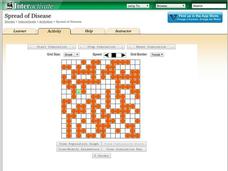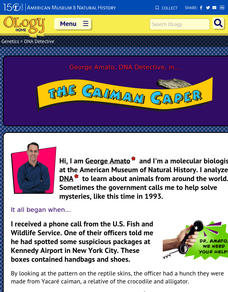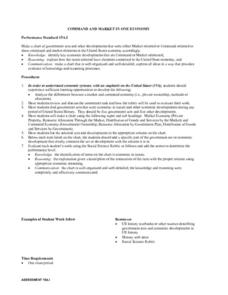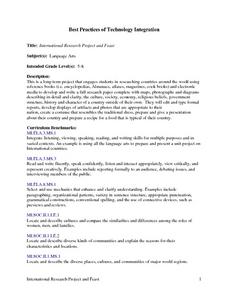Curated OER
Rights of the Accused in Search and Seizure
Students explain the rationale behind the Fourth Amendment, and the types of activity regulated by the Constitution. They analyze situations, and explain a citizen's rights when an unlawful search or seizure is conducted.
Curated OER
Lessons in Legal Ethics: Crime and the Media
High schoolers examine a variety of ethical issues that arise in criminal cases. They get into groups, and perform a case study of a real situation in which many of these ethical issues came up. All of the worksheets needed to...
Curated OER
Indiana Courts: How Do They Work?
Students identify the branches of Indiana's judicial system and determine the differences between the different courts and different types of cases. Students create a flow chart showing how a court case works its way through the legal...
Curated OER
Veterinary Medicine
All of the aspects of the veterinary profession are covered in this slideshow. It would be a great help to those considering a career in this area. Academic expectations, types of specialization, and some of the necessary skills are...
Anchorage School District
Hints for Writing a Conclusion
Writing the conclusion of an essay can often seem like a superfluous or daunting task. Support your young writers in understanding the various types and purposes of a conclusion paragraph, such as summarizing key points of a paper or...
Charleston School District
Intro to Functions
How are functions related to chicken nuggets? A video teaches the concept of a function using the idea of a nugget-making machine as an analogy for a function machine. Learners determine if a relation is a function from an equation...
Shodor Education Foundation
Spread of Disease
Control the spread of a contagious disease. An applet allows pupils to run a simulation on the spread of a disease. Rules govern how the disease is spread and the length of time it takes to recover. Learners view the spread visually and...
American Museum of Natural History
DNA Detective
Match up the DNA code. Pupils read the website from the American Museum of Natural History about how DNA can determine whether a skin is from a particular type of reptile. Using the same technique, learners match up products with the...
Curated OER
Cold War Conflict in Vietnam: The Vietnam-Era Presidency
Comparing and evaluating various media types is a great way to build critical analysis skills. Learners read about the Vietnam era presidency, specifically the foreign policy established by Johnson and Nixon. Then they compare several...
National Energy Education Development Project
Great Energy Debate
If someone yelled for eight years and eight months, they could produce enough energy to heat one cup of coffee. A lesson on energy encourages scholars to research 10 different energy sources in groups before playing a game. Twenty...
US Institute of Peace
Mediating Conflict
Two's a negotiation, but three's a mediation! Demonstrate the differences between the two processes through a role-playing lesson. The activity familiarizes pupils with the role of a mediator and examines the types of situations that...
California Academy of Science
Nuclear Energy: What's Your Reaction?
OSHA confirms that rules governing worker safety at nuclear power plants ranks higher than worker safety in offices. Scholars must consider safety, cost, alternatives, and other factors before recommending whether a town should build a...
Tutorials Point India Private
E-Commerce Tutorial
How does electronic commerce benefit organizations, customers, and society? Scholars read about e-commerce as it applies to modern business practices in an informative tutorial. Pupils also discover different types of business...
Curated OER
Imposing Democracy
Twelfth graders discuss the probability of imposing a democracy in a country in which there is no history of this type of government being successful. Using the internet, they work together to research Japan's experience with democracy...
Curated OER
Create Your Own Country!
Students create their own countries. In this geography skills activity, students establish governments, cultural backgrounds, atlas/geography components, national anthems, and national symbols for a country they create.
Curated OER
The Great Depression and the 1990s
High schoolers examine government-funded programs. In this government lesson, students research legislation from the Depressions era as well as current legislation regarding government-funded programs. High schoolers evaluate the current...
Curated OER
Command and Market in One Economy
Students organize governmental acts on a chart as either a Market or Command economy. In groups, they note the characteristics of each type of economy and identify their differences. They also explain any item that is related to the...
Curated OER
The U.S. Constitution
Young scholars explain the differences between the three branches of government. Using the structure of a democracy, they listen to text about the United States Constitution. They discover how their government affects their lives in...
Curated OER
Why a President? Why not a King?
Learners research how and why a country elects to have an executive branch of the government. They study the office of the Presidency of the US.
Curated OER
Economics: The Scarcity Principle
Students discover how scarcity leads to economic choices. They examine its effect on individuals, business, and governments. Students simulate various scenarios to determine the role scarcity plays in each.
Curated OER
George Washington and the Rule of Law
students compare The rule of law with the rule of men and consider life under each of these types of governments.In this government instructional activity, students read a primary source to examine the importance of the rule of law.They...
Curated OER
Limits of Power
Middle schoolers examine the importance of limiting power in governments. In this government lesson, students investigate the importance of placing limits on government by looking at the US Constitution. They look at ways that being an...
Curated OER
The Right to Vote
Students discover voting barriers. In this government lesson plan, students explore the history of voting. Students work in small groups to analyze and debate if certain groups of people should have the ability to vote or not.
Curated OER
International Research Project and Feast
Students research countries around the world. They develop and write a research paper that includes maps, photographs, and diagrams. They describe the culture, society, economy, religious beliefs, government structure, and history of...
Other popular searches
- Types of Government
- 3 Types of Government
- Three Types of Government
- Five Types of Government
- Types of Government Diagram
- World Types of Government
- Government Types Lesson Plans
- World Government Types
- Types of Government Systems
- Different Types of Government
- Compare Government Types
- Different Government Types























